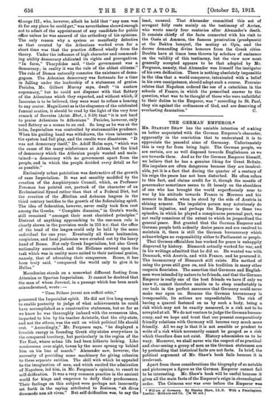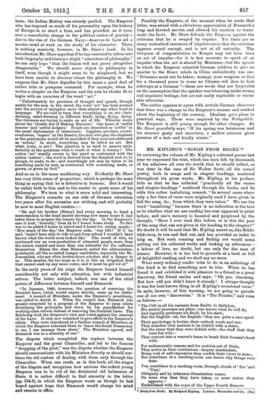THE GERMAN EMPEROR.*
Ma. STANLEY SHAW has the amiable intention of /raking us better acquainted with the German Emperor's character, apparently in the conviction that to understand it is to appreciate the peaceful aims of Germany. Unfortunately this is very far from being logic. The German people, we are certain, are as well disposed towards Englishmen as we are towards them. And as for the German Emperor himself, we believe that he has a genuine liking for Great Britain. His impulses are often dangerous because they are incalcul- able, yet it is a fact that during the quarter of a century of his reign the peace has not been disturbed. He often refers to this fact, and claims credit for it, though the mantle of peacemaker sometimes seems to fit loosely on the shoulders of one who has brought the world superfluously near to war by his attitude towards France in Morocco and his menace to Russia when he stood by the side of Austria in shining armour. The impulsive person may notoriously do himself injustice, and perhaps the Emperor in these two episodes, in which he played a conspicuous personal part, was not really conscious of the extent to which he jeopardized the general peace. But granted that the German Emperor and German people both ardently desire peace and are resolved to maintain it, there is still the German bureaucracy which acknowledges no responsibility either to Parliament or people.
That German officialdom has worked for peace is unhappily disproved by history. Bismarck actually worked for war, and in his writings admitted that he did so. He wanted war with Denmark, with Austria, and with France, and he procured it. The bureaucracy of Bismarck still exists. His method of using the press still goes on, and his tradition in many other respects flourishes. The assertion that Germans and English- men were intended by nature to be friends, and that the German Emperor is really one of the best friends we have if only we knew it, cannot therefore enable us to sleep comfortably in our beds in the perfect assurance that Germany could never make war upon us. Because the German bureaucracy is irresponsible, its actions are unpredictable. The risk of having a quarrel fastened on us by such a body, being a risk which may not be exactly measured, is a risk not to be accepted at all. We do not venture to judge the Germanbureau- cracy, and we hope and trust that our present comparatively friendly relations with Germany will become very much more friendly. All we say is that it is not sensible or prudent to write of a risk which necessarily cannot be gauged as a risk which therefore does not exist. History admonishes us to be wary. Moreover, we shall never win the respect of so practical and clear-seeing a group of men as the German statesmen are by pretending that historical facts are not facts. In brief, the political argument of Mr. Shaw's book fails because it is irrelevant.
Apart from these considerations the biography of so notable and picturesque a figure as the German Emperor cannot fail to be interesting. Mr. Shaw's book will be useful because it gives all the main facts of the Emperor's reign in chronological order. The Crimean war was over before the Emperor was William of Germane. By Stanley Shaw, LL.D. With a Frontispiece. London Methuen and Co. gm. 6d. net.]
born; the Indian Mutiny was already quelled. The Emperor who has imposed so much of his personality upon the history of Europe in so short a time, and has presided, as it were, over a remarkable change in the political centre of gravity— due to the rise of the German Navy—deserves to have set a master-mind at work on the study of his character. There is nothing masterly, however, in Mr. Shaw's book. In his introduction Mr. Shaw says that if he has ventured to infuse into both biography and history a slight "admixture of philosophy," he can only hope "that the fusion will not prove altogether disagreeable." We should never object to philosophy in itself, even though it might seem to be misplaced, but we have been unable to discover where the philosophy is. We suppose that Mr. Shaw dignifies by this name a good deal of rather trite or pompous comment. For example, when he writes a chapter on the Emperor and the arts he thinks fit to begin with an excursus of the word " art."
"Unfortunately for precision of thought and speech, though useful for the man in the street, the word ' art' has been pressed into the service of metaphor more than almost any other word in language. We are told in turn that everything is an art—hair- dressing, salad-dressing (a different kind), lying, flying, dying. The Germans are trying to make an art of life. Whistler wrote about the Gentle Art of Making Enemies.' One hears of artful hussies' and 'artful dodgers.' People are described as 'artful' in the small diplomacies of intercourse. Jugglers, acrobats, sword- swallowers, supers' at the theatre, the men who play the elephant in the pantomime would all be mortified if they were not addressed as 'artists.' In short, everything may be called an art. But what, truly, is art ? The question is as hard to answer satis- factorily as the questions what is truth or what is beauty ? The notion `art' usually occurs to the mind as contrasted with the notion 'nature' ; the word is derived from the Sanskrit root ar, to plough, to make, to do ; and accordingly art may be taken to be something made by man, as contrasted with something made, or grown, or given by God."
And so on in the same maddening way. Evidently Mr. Shaw has very little sense of proportion; which is perhaps the same thing as saying that he is defective in humour. But it would be unfair both to him and to the reader to quote more of his philosophy. We turn to what is more solid and interesting. The Emperor's remarks on one side of German education two years after his accession are striking, and will probably be new to most English readers :- "He and his brother (Henry) had every morning to hand a memorandum to the head master showing how many hours it had taken them to prepare the lessons for the day. In the Emperor's case it took, honestly,' from 64 to 7 hours' home study. To this was to be added 6 hours in school and 2 hours for eating meals- ' How much of the day,' the Emperor asks, was left ? If I,' he said, hadn't been able to ride to and from school I wouldn't have known what the world even looked like.' The result of this, he continued was an over-production of educated people, more than the nation wanted and more than was tolerable for the sufferers themselves. Hence the class Bismarck called the abiturienten- proletariat, all the so-called hunger candidates, especially the Mr. Journalists, who are often broken-down scholars and a danger to us. This surplus, far too large as it is, is like an irrigation field that cannot soak up any more water, and it must be got rid of."
In the early years of his reign the Emperor busied himself considerably not only with education, but with industrial reform. The latter subject, indeed, was one of the chief points of difference between himself and Bismarck.
"In January, 1890, however, the question of renewing the Socialist Laws, which would expire shortly, came up for settle- ment. A council of Ministers, under the Emperor's presidency, was called to decide it. When the council met, Bismarck was greatly surprised by a proposal of the Emperor to issue edicts developing the principles laid down by his grandfather for working-class reform instead of renewing the Socialist Laws. The Reichstag took the Emperor's view and voted against the renewal of the Laws. It only now remained to give effect to the Emperor's edicts. They were considered at a further council of Ministers, at which the Emperor exhorted them to 'leave the Social Democracy to me, I can manage them alone.' The Ministers agreed, and Bismarck was in a minority of one."
The dispute which completed the rupture between the Emperor and the great Chancellor, and led to the famous " dropping of the pilot," was the dispute whether the Emperor should communicate with his Ministers directly or should con- tinue the old custom of dealing with them only through the Chancellor. When one reads, as in this book, all the stages of the dispute and recognizes how anxious the ardent young Emperor was to be rid of the dictatorial old helmsman of State, it is rather difficult to find sincerity in the letter (pp. 134-5), in which the Emperor wrote as though he had hoped against hope that Bismarck would change his mind and remain in office. Possibly the Emperor, at the moment when be wrote that letter, was seized with a chivalrous appreciation of Bismarck's long and devoted service, and allowed his emotion to trans- mute the facts. - Mr. Shaw defends the Emperor against the criticism that he is swayed by impulse. Yet there are so many undoubted instances of impulsiveness that the criticism appears sound enough, and is not at all unkindly. The telegram of congratulation to Kruger may not have been an act of impulse—for it is snot accurate to speak of an impulse when the act is shared by Ministers—but the speech in which the Emperor exhorted German soldiers to give no quarter to the Boxer rebels in China undoubtedly was one. " Prisoners must not be taken ; manage your weapons so that for a thousand years to come no Chinese will dare to look sideways at a German "—those are words that are forgivable on the assumption that the speaker was labouring under strong and impulsive feelings, but are not easily explicable or excus- able otherwise.
The author appears to agree with certain German observers that there was a change in the Emperor's manner and method about the beginning of the century. Idealism gave place to practical ways. These were required by the Weltpolitik. The Emperor is still young enough for other changes. As Mr. Shaw gracefully says, "If his spring was boisterous and his summer gusty and uncertain, a mellow autumn gives promise of a hale and kindly winter."















































 Previous page
Previous page